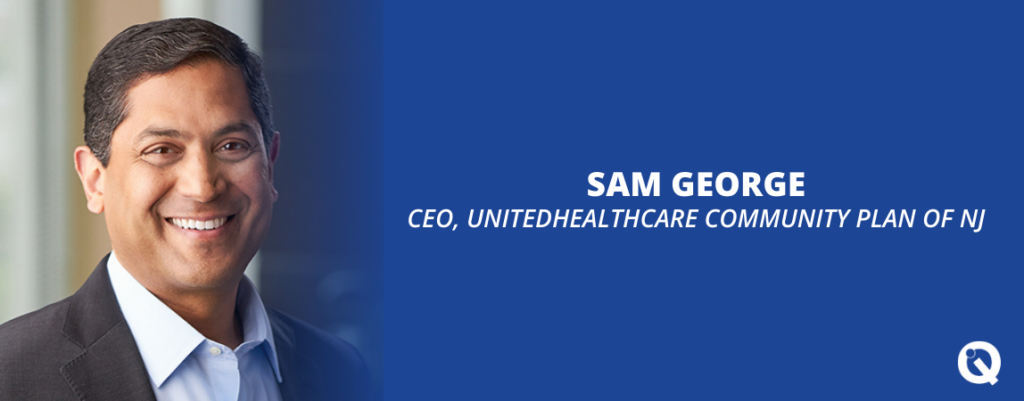Sam George, CEO, UnitedHealthcare Community Plan of NJ, a member of the Quality Institute’s Plan Council.
You joined UnitedHealthcare Community Plan of NJ about a year ago, having moved here from the Midwest. Can you share one or two of your top priorities?
At UnitedHealthcare we are very supportive of the First Lady’s maternal program Nurture NJ and its commitment to ensuring equity in maternal and infant health outcomes and to reducing overall maternal and infant mortality and morbidity in the state. The majority of the members we serve in NJ are moms and kids and they are disproportionately impacted by these disparities. As an organization, we are committed to creating a meaningful impact for our young moms and kids.
A key priority for us at UnitedHealthcare is Integrated whole person care. A member receives health care benefits typically from multiple sources — and often these are uncoordinated. Managing a member’s care across medical, pharmacy, dental, behavioral health services, housing, etc. ensures the optimal outcome. We’re excited about some of the approvals in the State’s recent 1115 waiver that bring behavioral health care and housing supports under coordination by managed care organizations. We are very focused on ensuring that the transition from fee-for-service to Managed Care has the lowest level of disruption for the members and the providers serving our members. Integrating Housing Transition Services and Tenancy Sustaining services will address one of the key Health Related Social Needs (HRSN) for our members. This will require effective coordination across multiple state agencies to ensure the member has timely and meaningful access to services supporting social drivers of health.
How does your experience in other states inform your work in New Jersey?
UnitedHealthcare serves Medicaid members in 32 states plus Washington D.C. This provides us with deep resources and a national knowledge base that we are able to tap into to inform our local strategies. For example, as NJ works to integrate housing supports, we are able to learn from our experience in multiple states and bring that knowledge to incorporate best practices in our local market.
Many of your plan members are pregnant individuals or children. Can you share a couple of ways you are working to ensure those members have timely access to care and services?
UnitedHealthcare’s Healthy First Steps program surrounds expectant moms with high frequency outreach: direct phone calls, mailings and incentives for the member and the provider. The intent is to support mom along the journey with various benefits like choosing a pregnancy provider and a pediatrician, scheduling appointments like pre-natal visits, lead screening, well child visits and immunizations. We work to remind both providers and members to schedule their next appointment and offer incentives for timely delivery of care including prenatal and postpartum care, vaccine administration and well child visits. We also offer the members rewards for service completion such as annual dental visits, lead screenings etc. Surrounding moms with these support services ensures the best outcomes for baby and mom.
UnitedHealthcare is the highest performing MCO in New Jersey for pediatric preventive dental care utilization. What steps did you take to meet the State’s performance requirements and what more do you think needs to be done to ensure that children are getting this critical care starting in their earliest years of life?
NJ FamilyCare has established targets for children’s preventive dental utilization. UnitedHealthcare has met or exceeded these targets every year since 2019. We are focused on supporting medical dental integration by engaging parents during pregnancy and preparing them to seek early dental care for their babies. We also collaborate with pediatricians and OBGYNs to provide early education on dental care. We have developed a broad network of high-quality dental providers available to see our members and we partner with key organizations like KinderSmile, led by Dr. Nicole McGrath, in their efforts to increase awareness about pediatric dental services. The key is involving parents early and soon, even before baby is born.

